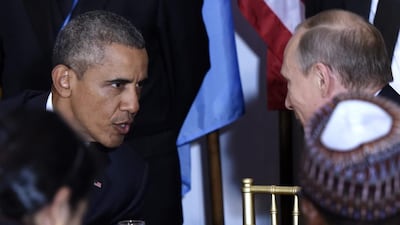WASHINGTON // US president Barack Obama imposed sanctions on Russian officials and intelligence services on Thursday in retaliation for Moscow’s alleged interference in the US presidential election.
The state department also kicked out 35 Russian diplomats from Moscow’s embassy in Washington and consulate in San Francisco, giving them and their families 72 hours to leave the United States. The diplomats were declared persona non grata for acting in a “manner inconsistent with their diplomatic status”.
Mr Obama said Russians will no longer have access to two Russian government-owned compounds in the US – one in Maryland and another in New York.
Russian officials have denied the Obama administration’s accusation that Moscow was trying to influence the presidential election by hacking American political sites and email accounts.
US intelligence agencies concluded that Russia’s goal was to help Donald Trump win – an assessment the president-elect has dismissed as ridiculous.
* Associated Press

